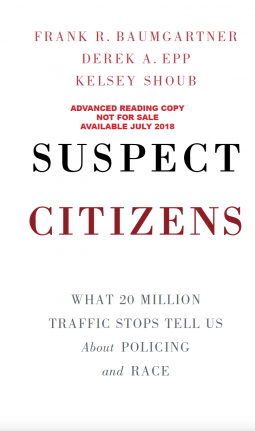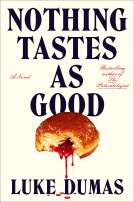
Suspect Citizens
What 20 Million Traffic Stops Tell Us About Policing and Race
by Frank R. Baumgartner, Derek A. Epp, Kelsey Shoub
This title was previously available on NetGalley and is now archived.
Send NetGalley books directly to your Kindle or Kindle app
1
To read on a Kindle or Kindle app, please add kindle@netgalley.com as an approved email address to receive files in your Amazon account. Click here for step-by-step instructions.
2
Also find your Kindle email address within your Amazon account, and enter it here.
Pub Date Apr 30 2018 | Archive Date Jul 25 2018
Talking about this book? Use #SuspectCitizens #NetGalley. More hashtag tips!
Description
Suspect Citizens: What 20 Million Traffic Stops Tell Us About Policing and Race offers the most comprehensive look to date at the most common form of police-citizen interactions: the routine traffic stop.
Throughout the war on crime, police agencies have used traffic stops to search drivers suspected of carrying contraband. From the beginning, police agencies made it clear that very large numbers of police stops would have to occur before an officer might interdict a significant drug shipment. Unstated in that calculation was that many Americans would be subjected to police investigations so that a small number of high-level offenders might be found. The key element in this strategy, which kept it hidden from widespread public scrutiny, was that middle-class white Americans were largely exempt from its consequences. Tracking these police practices down to the officer level, Suspect Citizens: What 20 Million Traffic Stops Tell Us About Policing and Race documents the extreme rarity of drug busts and reveals sustained and troubling disparities in how racial groups are treated.
Suspect Citizens: What 20 Million Traffic Stops Tell Us About Policing and Race is an invaluable read for scholars and policymakers interested in equality within criminal justice and improving relationships between communities of color and the police officers appointed to serve them.
Advance Praise
“This book represents a monumental scholarly accomplishment.”
- Vincent L. Hutchings, Hanes Walton Jr. Collegiate Professor, The University of Michigan
“For well over a decade North Carolina law enforcement agencies led the nation in collecting traffic stop data as directed by state legislation. Unfortunately, neither state legislators nor law enforcement leaders understood how to interpret or use those data. Law enforcement leaders in North Carolina and across the nation can use this work to better enforce traffic safety laws while building a trusting, transparent relationship with their communities.”
- Harold E. Medlock, Chief of Police (retired), Fayetteville (N.C.) Police Department
“A deep dive into the causes and injurious consequences of racialized policing. Avoiding easy answers and delivering bold, actionable findings, Baumgartner, Epp, and Shoub capture an essential insight: that aggressive policing strategies exact a high price in community alienation but deliver precious few benefits in public safety.”
- Vesla M. Weaver, Bloomberg Distinguished Associate Professor, Johns Hopkins University
“Baumgartner, Epp, and Shoub highlight the different reality of driving in North Carolina faced by black, white, and Hispanic drivers. This book is a must-read for scholars and policymakers.”
- Traci Burch, Associate Professor, Northwestern University
“The most complete picture we have of who the police interact with and how. Suspect Citizens combines
‘big data,’ careful thought, and meticulous and accessible analysis to offer critical insights into police behavior.”
- Peter K. Enns, Author of Incarceration Nation and Associate Professor of Government, Cornell University
Available Editions
| EDITION | Paperback |
| ISBN | 9781108454049 |
| PRICE | $24.99 (USD) |
Average rating from 5 members
Featured Reviews
 Linda S, Librarian
Linda S, Librarian
SUSPECT CITIZENS (Cambridge UP, June 30) by Frank R Baumgartner, Derek A Epp and Kelsey Shoub deals with "What 20 Million Traffic Stops Tell Us About Policing and Race," another high interest topic for many of our students. This text concludes: "First, there are stark differences [in how police interact with the public]; Second, young men of color are clearly targeted for more aggressive treatment. Third, these differences are not fully justified by differences in criminality. Fourth, the aggressive use of traffic stops ... is surprisingly inefficient, rarely leading to arrest for contraband."
Baumgartner is a professor at the University of North Carolina, Chapel Hill and has written previous books about social justice issues like the death penalty. Epp is an assistant professor at the University of Texas, Austin and Kelsey Shoub is a graduate student at UNC. In SUSPECT CITIZENS, they use data from traffic stop in the state of North Carolina from 2002 to 2016 to both document racial bias and to support suggestions for improved community relations, believing that public safety is enhanced when trust is restored. Their analysis is supported with statistical modeling and roughly 75 figures and tables, plus an extensive set of references and notes. Hopefully, other jurisdictions are able to use build on this work.
 Dawn W, Reviewer
Dawn W, Reviewer
Although, when I first read the description of this book the term “driving while black” immediately took the forefront of my thoughts. I am happy this book is so much more than that and it gives us reasons to think beyond our own assumptions and feelings. It gives us the facts, figures, and amendments from an extreme amount of research.
 Christine E, Reviewer
Christine E, Reviewer
Disclaimer: ARC via Cambridge University Press and Netgalley in exchange for a fair and honest review.
Recently, during a commute, I overheard a conversation between two men. They were debating stop and frisk policies as well as road checkpoints/spot checks. The first man, Adam let’s call him, said that he didn’t understand why people would be upset about a pat down or a road stop. After all, if you didn’t do anything wrong, you have nothing to fear. His companion, let’s call him Bert, responded with how many times he had been pulled over because he had been a young black male in a car that police believed should be out of his price range. Bert joined the army right after high school, he said, and could afford to drive such vehicles. His fellow soldiers who were white did not get stopped. Adam volleyed back with well, he had been profiled when he had been pulled over, and then was forced to admit that he had been speeding.
Then I got off the train. I’ll leave you to figure out which person was black and which white.
Reading books like Suspect Citizens for people before having the above conversation with anyone.
It should be noted that the work of Baumgarther, Epp, and Shoub focuses on one state, North Carolina, but considering what the presentation and analysis of the data prove that getting pulled over when “driving while black” is really a thing. Not that everyone in the United States didn’t know this, but let’s be honest, odds are you know at least one person who says that it isn’t true. The authors note that part of the reason for this book is so that people who are not black can approach dialogue about police and race with compassion and knowledge.
I find books like this difficult to rate. It is a study. There is a great deal of data being presented to the reader. At times, such use of numbers can be dull, but the writers don’t present information dully. Furthermore, connections are made to wide problems (like low voter turn our). The book isn’t entirely negatively. It also takes the time to go into great detail about the history of the law that triggered the correction of the data as including the full law in an appendix. Attention is given to the history of pulling a car over and the difference between reasons for a driver being pulled over.
There is something information about the pulling over of Hispanic and Native Americans, but the focus is on African Americans.
The book closes with some personal stories of those that have been pulled over. The stories include various outcomes but are very powerful.
Highly recommended.
Readers who liked this book also liked:
ReShonda Tate
General Fiction (Adult), Historical Fiction, Multicultural Interest
Silvia Moreno-Garcia
Historical Fiction, Literary Fiction, Sci Fi & Fantasy
Marie Bostwick
Historical Fiction, Literary Fiction, Women's Fiction


















